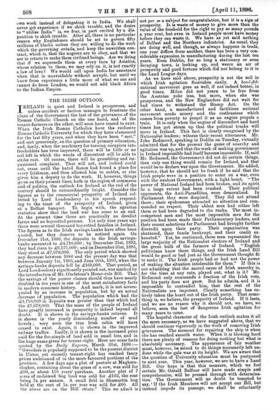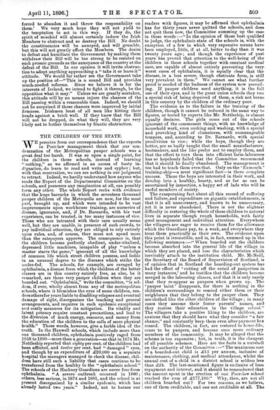THE IRISH OUTLOOK.
IRELAND is quiet and Ireland is prosperous, and unless accident or faction manages to frustrate the plans of the Government the last of the grievances of the Roman Catholic Church on the one hand, and of the tenant-farmers on the other, will soon have ceased to exist. When the Irish Roman Catholics have the exclusive Roman Catholic University for which they have clamoured for the last fifty years, and when they have been "met," and met generously, on the question of primary education, and, lastly, when the machinery for turning occupiers into freeholders has been improved, there will be little or no soil left in which the weeds of discontent will be able to strike root. Of course' there will be grumbling and im- passioned complaint. That will not, and indeed could not, cease until the hated Saxon had found a place for every Irishman, and then allowed him to sublet, or else given him a deputy to do the work. If, however, things _go on on their present lines, both in the region of commerce and of politics, the outlook for Ireland at the end of the century should be extraordinarily bright. Consider the figures as to the commercial prosperity of Ireland col- lected by Lord Londonderry in his speech respond- ing to the toast of the prosperity of Ireland, given at a Belfast banquet. To begin with, the agrarian statistics show that the land war has come to an end. At the present time there are practically no derelict farms and no boycotted persons. Yet only nine years ago there were several thousand boycotted families in Ireland. The figures as to the Irish savings-banks have often been quoted, but they deserve to be noticed again. On December 31st, 1886, the deposits in the Irish savings- banks amounted to £4,710,000; by December 31st, 1892, they had risen to £6,171,000; and on December 31st, 1895, they stood at £7,678,000. The only period which showed any decrease between 1886 and the present day was that between January 1st, 1893, and June 30th, 1893, when the savings-banks deposits fell by £160,000. That period, as Lord Londonderry significantly pointed out, was marked by the introduction of Mr. Gladstone's Home-rule Bill. That the savings of the poorer classes should thus have nearly doubled in ten years is one of the most satisfactory facts in modern economic history. And mark, it is not accom- panied by an increase in population, but by an actual decrease of population. The population which had the £4,710,000 in deposits was greater than that which had the £7,678,000. That the mass of the people of Ireland have greatly increased in prosperity is indeed beyond all doubt. It is shown in the savings-banks returns. It is shown in the yearly diminishing number of mud hovels ; very, soon the true Irish cabin will have ceased to exist. Again, it is shown in the improved railway traffics. Lastly, it is shown in the increased price paid for the fee-simple of land sold in small lots, and in the huge sums given for tenant-right. Here are some facts quoted by the Daily Express, March 31st, 1896 :— " Gweedore is popularly supposed to be the poorest district in Ulster, yet recently tenant-right has reached fancy prices undreamed of in the more favoured portions of the province. A few days ago a plot of pasture at lltlaghera- clogher, containing about the grass of a cow, was sold for £90, or about 150 years' purchase. Another plot of 7 acres of reclaimed bog land was sold for £163, the rent being 7s. per annum. A small field in Shamartin bog held at the rent of is. per year was sold for £60. All the above are on the Hill estate." This we admit is not per se a subject for congratulation, but it is a sign of prosperity. It is waste of money to give more than the value of the freehold for the right to pay so many pounds a year rent, but even in Ireland people must have money before they can waste it. We have as yet said nothing of Belfast and the Northern industries. As usual, they are doing well, and though, as always happens in trade, one year differs from another, there has been a very con- siderable expansion in manufacturing during the last ten years. Even Dublin, for so long a stationary or even decaying town, is looking up, and wears an air of prosperity and good fortune which did not belong to it in the Land League days.
As we have said above, prosperity is not the soil in which Irish agitation flourishes easily. A boncl-fide national movement goes as well, if not indeed better, in good times. Milan did not yearn to be free from the Austrian yoke less, but more, when she was prosperous, and the New Englanders did not wait for bad times to withstand the Stamp Act. On the other hand, a manufactured and factitious national movement needs misery and the restlessness which comes from poverty to propel it as an engine propels a train. It is only when the engine of discomfort and hard times has got steam up that the political trucks will move in Ireland. This fact is clearly recognised by the Nationalist leaders ; witness their recent utterances. Mr. John Redmond, speaking in Dublin on Tuesday, virtually admitted that for the present the game of anarchy and agitation was up, and that the work of making government in Ireland impossible had itself become impossible. If, said Mr. Redmond, the Government did not do certain things, then only one thing would remain for Ireland, and that would be to declare war upon the Government. He added, however, that he should not be frank if he said that the Irish people were in a position to enter on a war, even with the weakest Government, with a light heart. "The power of National Ireland had been broken, and its spirit to a large extent had been crushed. Their political opponents, the Anti-Parnellites, were demoralised. In Parliament they were despised. They did not attend there ; their spokesman attracted no attention and com- manded no respect. Their ablest men had either left them or had been degraded to the ranks. The most in- competent men and the most impossible men for the position had been made their Parliamentary leaders, and their recent selections for Parliament had brought further discredit upon their party. Their organisation was shattered, their funds bankrupt, and their credit ex- hausted." Yet, he continued, these men represented the large majority of the Nationalist electors of Ireland and the great bulk of the farmers of Ireland. "English politicians knew these things, and the Irish Land Bill would be good or bad just as the Government thought fit to make it. The Irish people had or had not the power of making the situation intolerable for them." If this is not admitting that the sacred cause of Irish anarchy is, for the time at any rate, played out, what is it? Mr. Redmond only commands a fraction of the Irish vote, and his party does not grow. But he admits, and it is impossible to contradict him, that the rest of the Nationalists are impotent. Clearly something has en- tirely taken the heart out of the Irish party. That some- thing is, we believe, the prosperity of Ireland. If it lasts, and we see no reason why it should not, we have, we believe, seen the last of dangerous Irish agitation for many years to come. The hopeful character of the Irish outlook makes it all the more necessary, as we have suggested above, that we should continue vigorously in the work of removing Irish grievances. The moment for repairing the ship is when she has reached smooth water. When it is blowing hard there are plenty of reasons for doing nothing but what is absolutely necessary. The appearance of fair weather must, however, be seized to do things necessarily left un- done while the gale was at its height. We are aware that the question of University education must be postponed to next year. This year, however, we are to have a Land Bill. Our hope is that this measure, which we feel certain Mr. Gerald Balfour will have made simple and comprehensive, will be pressed through with determina- tion. The Government will no doubt be tempted to say, If the Irish Members will not accept our Bill, but instead impede its passage, we shall be reluctantly forced to abandon it and throw the responsibility on them.' We very much hope they will not yield to the temptation to act in this way. If they do, the spirit of mischief will almost certainly induce the Irish Members to obstruct and so destroy the Bill. No doubt the constituencies will be annoyed, and will grumble, but this will not greatly affect the Members. The desire to defeat and humiliate the Government by making them withdraw their Bill will be too strong to be resisted on such prosaic grounds as the annoyance of the country at the defeat of the Bill. In our opinion it will invite obstruc- tion to adopt anything approaching a "take it or leave it" attitude. We would far rather see the Government take up the position of—" This is a sound Bill and provides much-needed reforms. Since we believe it is for the interests of Ireland, we intend to fight it through, be the opposition what it may." Unless we are greatly mistaken, this attitude will by no means injure the chances of the Bill passing within a reasonable time. Indeed, we should not be surprised if those chances were improved by initial firmness. Irishmen least of all men like bitting their heads against a brick wall. If they know that the Bill will not be dropped, do what they will, they are very likely not to bother themselves by frantic obstruction.



































 Previous page
Previous page